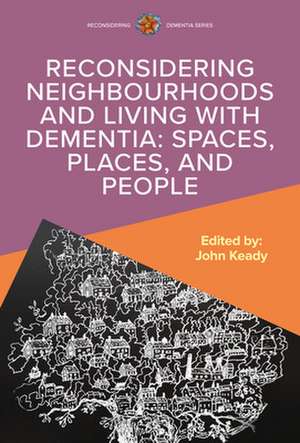Reconsidering Neighbourhoods and Living with Dementia: Spaces, Places, and People
Autor John Keadyen Limba Engleză Paperback – 17 oct 2023
Steven R. Sabat, Professor Emeritus of Psychology, Georgetown University, Washington D.C., USA
“It is indicative reading for educators, researchers, clinicians and policy makers nationally and internationally. By grounding the underpinning research in the lived experience of people with dementia, the book’s appeal extends to voluntary and community groups. Reading it is a must!”
Assumpta Ryan, Professor of Ageing and Health, Ulster University, UK
“A remarkable contribution to the ‘Reconsidering Dementia’ series.”
Bob Woods, Emeritus Professor, Bangor University, UK
This book provides research based insights into the lived experience of dementia, aging in place and the use of participatory and creative social research approaches in the field of dementia studies.
For the first time the key findings of one of the UKs largest funded social science research projects, the Neighbourhoods study, are assembled into one accessibly written blueprint for dementia care aiding better understanding of the place and position of those living with dementia in the home and neighbourhood context.
Reconsidering Neighbourhoods and Living with Dementia highlights the importance of home for people living with dementia and that neighbourhoods are seen to be relational, virtual, technological, connected, lived, remembered, and imagined, and to exist within and across time. The book is organised under five key parts:
•The Lived Neighbourhood
•Neighbourhoods, Measurement and Technology
•Neighbourhoods and Big Data
•Personal Well-Being and Neighbourhood Programme Support
•Bringing it Together and Future Directions
This comprehensive book is appropriate to a wide range of readers and disciplines including those living with dementia, the related health and voluntary professions, family carers, practitioners, academics, and students undertaking a variety of courses aligned to gerontology, dementia studies and human geography.
The Reconsidering Dementia Series is an interdisciplinary series published by Open University Press that covers contemporary issues to challenge and engage readers in thinking deeply about the topic. The dementia field has developed rapidly in its scope and practice over the past ten years and books in this series will unpack not only what this means for the student, academic and practitioner, but also for all those affected by dementia.
Series Editors: Dr Keith Oliver and Professor Dawn Brooker MBE.
John Keady is a mental health nurse who has been involved in dementia care for over 30 years. Since 2006, he has held a joint appointment between the University of Manchester and the Greater Manchester Mental Health NHS Foundation Trust. He was the Chief Investigator of the Neighbourhoods study.
Preț: 149.51 lei
Preț vechi: 200.92 lei
-26% Nou
Puncte Express: 224
Preț estimativ în valută:
28.61€ • 29.76$ • 23.94£
28.61€ • 29.76$ • 23.94£
Carte disponibilă
Livrare economică 21 februarie-04 martie
Livrare express 08-14 februarie pentru 79.77 lei
Preluare comenzi: 021 569.72.76
Specificații
ISBN-13: 9780335251728
ISBN-10: 0335251722
Pagini: 392
Dimensiuni: 152 x 230 x 15 mm
Greutate: 0.48 kg
Editura: McGraw Hill Education
Colecția Open University Press
Locul publicării:United Kingdom
ISBN-10: 0335251722
Pagini: 392
Dimensiuni: 152 x 230 x 15 mm
Greutate: 0.48 kg
Editura: McGraw Hill Education
Colecția Open University Press
Locul publicării:United Kingdom
Cuprins
Introduction
Part I: The Lived Neighbourhood
Chapter 1: This is Our Story: Co-research and the meaning of neighbourhood for the Open Doors Research Group
Chapter 2: Overcoming Stigma in the Neighbourhood: Learning lessons from a co-operative inquiry led by people with dementia living in Salford, UK.
Chapter 3: How People Living with Dementia Experience and Contribute to the Social Life of Everyday Places
Chapter 4: Both and Neither Here nor There: The importance of physical and social thresholds in dementia
Chapter 5: Staying Connected: Neighbourhood-based networks and relationships experienced among people living alone with dementia
Chapter 6: The Cultural-Linguistic, Visual Neighbourhood of Deaf People and Dementia
Part II: Neighbourhoods, Measurement and Technology
Chapter 7: A New Paradigm for Developing Outcomes, Measurement Instruments and the Evidence Base: Privileging the views of key stakeholders with lived experience
Chapter 8: The DEMTRAIN study: Developing the evidence base for evaluating dementia training in NHS hospitals
Chapter 9: Doing Things Together in the Neighbourhood: Towards a health promoting approach to couples’ relationships and everyday life in dementia
Part III: Neighbourhoods and Big Data
Chapter 10: Dementia across local neighbourhood districts in England
Part IV: Staff Well-Being and Programme Support
Chapter 11: A Safe Space: The staff well-being service for the Neighbourhoods and Dementia study
Chapter 12: Being There for Everyone: The opportunities and challenges in large-scale project administration
Part V: Bringing it Together and Future Directions
Chapter 13: Conclusion
Part I: The Lived Neighbourhood
Chapter 1: This is Our Story: Co-research and the meaning of neighbourhood for the Open Doors Research Group
Chapter 2: Overcoming Stigma in the Neighbourhood: Learning lessons from a co-operative inquiry led by people with dementia living in Salford, UK.
Chapter 3: How People Living with Dementia Experience and Contribute to the Social Life of Everyday Places
Chapter 4: Both and Neither Here nor There: The importance of physical and social thresholds in dementia
Chapter 5: Staying Connected: Neighbourhood-based networks and relationships experienced among people living alone with dementia
Chapter 6: The Cultural-Linguistic, Visual Neighbourhood of Deaf People and Dementia
Part II: Neighbourhoods, Measurement and Technology
Chapter 7: A New Paradigm for Developing Outcomes, Measurement Instruments and the Evidence Base: Privileging the views of key stakeholders with lived experience
Chapter 8: The DEMTRAIN study: Developing the evidence base for evaluating dementia training in NHS hospitals
Chapter 9: Doing Things Together in the Neighbourhood: Towards a health promoting approach to couples’ relationships and everyday life in dementia
Part III: Neighbourhoods and Big Data
Chapter 10: Dementia across local neighbourhood districts in England
Part IV: Staff Well-Being and Programme Support
Chapter 11: A Safe Space: The staff well-being service for the Neighbourhoods and Dementia study
Chapter 12: Being There for Everyone: The opportunities and challenges in large-scale project administration
Part V: Bringing it Together and Future Directions
Chapter 13: Conclusion
